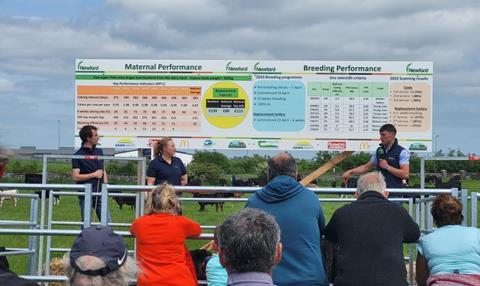“Dramatic” advances in the age that animals are slaughtered as compared to national averages, “excellent” growth rates, a reduction in silage requirements and the use of 100% AI were some of the measures being deployed to reduce costs and increase sustainability at one of Ireland’s leading demonstration farms.

A “Meeting the Challenges” booklet, produced by Teagasc for the recent Open Day at Newford Farm in Athenry, Co Galway, has detailed the advances achieved since the farm was established by Dawn Meats and Teagasc in 2015, with support from McDonald’s and the Irish Farmers Journal.
The farm seeks to demonstrate best practice in sustainable suckler beef production and over the past eight years heifers born on Newford were finished from 18-20 months of age while males were finished as steers from 20-22 months.
The booklet details how an extension of the grazing season meant the 2021 born beef heifers were slaughtered under 18 months of age and how this led to significant savings by reducing silage requirements and reducing the need to purchase expensive concentrates.
One of the biggest changes at Newford, according to Teagasc, has been the move to 100% artificial insemination. The change has allowed better use of genetics, through matching good terminal beef sires with suitable cows to improve the beef characteristics of progeny while still retaining calving ease.
“Some may be fazed by the thoughts of using 100% artificial insemination on a fragmented suckler farm. However, this was certainly not the case and in fact the direct opposite for Newford based on the breeding performance of the herd,” itstates.
Teagasc details how the Irish agriculture sector is obliged to reduce greenhouse gas emissions by 25% by 2030 and how lowering the age of slaughter of animals on beef farms by three months, from 27 to 24 on average, is considered key to achieving reductions.
“This three-month reduction in slaughter age will generate a reduction in the quantity of emissions from the national beef herd, delivering up to 0.7 million tonnes of GHG emissions reductions,” it says.
“The primary way in which this can be achieved is by ensuring animal performance levels are optimised from grazed pasture and high-quality silage at farm level, something which Newford farm has been working on since 2015. The improvements in animal performance witnessed at farm level have led to a reduced age of slaughter whilst still meeting market specifications.”
Data compiled for the Open Day, highlights the improvements achieved through developments in genetics, better grassland management and better nutrition and animal health.
It shows that the carbon footprint of suckler to beef systems nationally is 23.8 kg carbon dioxide per kg of carcass weight. However, Newford animals produced 20.4 kg carbon dioxide equivalent per kg carcass weight, which is 14.3% lower than the national average.
Niall Browne, chief executive of Dawn Meats said: “The positive results achieved to date by Newford Farm are extremely promising and show the importance of accelerating the pace of adoption of MACC measures identified by Teagasc, which are successfully reducing emissions while maintaining productivity and quality. We are proud to be involved in this work and in helping farmers address the common challenges we all share, in achieving economic, social and environmental sustainability.”
This story was originally published on a previous version of the Meat Management website and so there may be some missing images and formatting issues.















